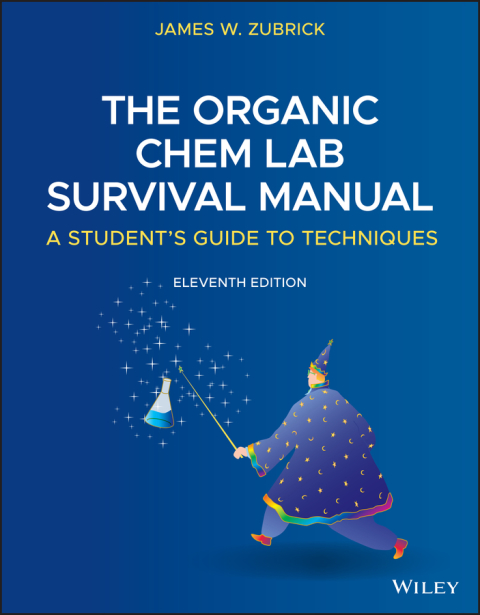Description
Efnisyfirlit
- Cover
- Preface to the Eleventh Edition
- Text Figures: Quick Reference Guide
- Chapter 1: Safety First, Last, and Always
- Accidents Will Not Happen
- Disposing of Waste
- Safety Data Sheets
- Green Chemistry
- An iBag for Your iThing
- Exercises
- Chapter 2: Keeping a Notebook
- A Technique Experiment
- A Synthesis Experiment
- The Six Maybe Seven Elements in Your Experimental Write-up
- The Acid Test
- Notebook Mortal Sin
- Calculation of Percent Yield (Not Yeild!)
- Estimation Is Your Friend
- Notes From My Bench
- Exercises
- Chapter 3: Mining Your Own Data
- Google and the Wiki
- The Terphenyl Anomaly
- Exercises
- Chapter 4: Jointware
- Stoppers with Only One Number
- Another Episode of Love of Laboratory
- Hall of Blunders and Things Not Quite Right
- The O-Ring and Cap Branch Out
- Greasing the Joints
- Storing Stuff and Sticking Stoppers
- Corking a Vessel
- Chapter 5: Microscale Jointware
- Microscale: A Few Words
- Uh-Oh Rings
- The O-Ring Cap Seal
- The Comical Vial (That’s Conical!)
- The Microscale Drying Tube
- Gas Collection Apparatus
- Chapter 6: Other Interesting Equipment
- Funnels, and Beakers, and Flasks—Oh My!
- The Flexible Double-Ended Stainless Steel Spatula
- Chapter 7: Pipet Tips
- Pre-Preparing Pasteur Pipets
- Pipet Cutting
- Pipet Filtering—Liquids
- Pipet Filtering—Solids
- Chapter 8: Syringes, Needles, and Septa
- The Rubber Septum
- Chapter 9: Clean and Dry
- Drying Your Glassware When You Don’t Need To
- Drying Your Glassware When You Do Need To
- Chapter 10: Drying Agents
- Typical Drying Agents
- Using a Drying Agent
- Following Directions and Losing Product Anyway
- Drying Agents: Microscale
- Drying in Stages: The Capacity and Efficiency of Drying Agents
- Exercises
- Chapter 11: On Products
- Solid Product Problems
- Liquid Product Problems
- The Sample Vial
- Hold It! Don’t Touch That Vial
- Chapter 12: The Melting-Point Experiment
- Sample Preparation
- Melting-Point Hints
- The Mel-Temp Apparatus
- The SRS DigiMelt
- The Fisher-Johns Apparatus
- The Thomas-Hoover Apparatus
- Using the Thiele Tube
- Exercises
- Chapter 13: Recrystallization
- Finding a Good Solvent
- General Guidelines for a Recrystallization
- Gravity Filtration
- The Buchner Funnel and Filter Flask
- The Hirsch Funnel and Friends
- Activated Charcoal
- The Water Aspirator: A Vacuum Source
- The Water Trap
- Working with a Mixed-Solvent System—The Good Part
- A Mixed-Solvent System—The Bad Part
- Salting Out
- World-Famous Fan-Folded Fluted Paper
- Exercises
- Chapter 14: Recrystallization: Microscale
- Isolating the Crystals
- Craig Tube Filtration
- Centrifuging the Craig Tube
- Chapter 15: Extraction and Washing
- Never-Ever Land
- Starting an Extraction
- Dutch Uncle Advice
- The Separatory Funnel
- How to Extract and Wash What
- Exercises
- Chapter 16: Extraction and Washing: Microscale
- Mixing
- Separation: Removing the Bottom Layer (Fig. 16.1)
- Separation: Removing the Top Layer (Fig. 16.2)
- Separation: Removing Both Layers
- Chapter 17: Sources of Heat
- Boiling Stones
- The Steam Bath
- The Bunsen Burner
- The Heating Mantle
- Proportional Heaters and Stepless Controllers
- Exercise
- Chapter 18: Clamps and Clamping
- Clamping a Distillation Setup
- Clipping a Distillation Setup
- Chapter 19: Distillation
- Distillation Notes
- Class 1: Simple Distillation (Fig. 19.1)
- The Distillation Example
- The Distillation Mistake
- Class 2: Vacuum Distillation
- Class 3: Fractional Distillation
- Azeotropes
- Class 4: Steam Distillation
- Steam Distillation Notes
- Simulated Bulb-to-Bulb Distillation: Fakelrohr
- Exercises
- Chapter 20: Microscale Distillation
- Like the Big Guy
- Microscale Distillation II: The Hickman Still
- Chapter 21: The Rotary Evaporator
- Exercises
- Chapter 22: Reflux and Addition
- Standard Reflux
- A Dry Reflux
- Addition and Reflux
- Exercise
- Chapter 23: Reflux: Microscale
- Addition and Reflux: Microscale
- Chapter 24: Sublimation
- Chapter 25: Microscale Boiling Point
- Microscale Boiling Point
- Ultramicroscale Boiling Point
- Chapter 26: Chromatography
- Adsorbents
- Separation or Development
- The Eluatropic Series
- Chapter 27: Thin-Layer Chromatography: TLC
- We Don’t Make Our Own TLC Plates Any More, But…
- The Plate Spotter
- Spotting the Plates
- Developing a Plate
- Visualization
- Interpretation
- Multiple Spotting
- Cospotting
- Other TLC Problems
- Preparative TLC
- Exercises
- Chapter 28: Wet-Column Chromatography
- Preparing the Column
- Compounds on the Column
- Visualization and Collection
- Wet-Column Chromatography: Microscale
- Flash Chromatography
- Microscale Flash Chromatography
- Exercises
- Chapter 29: Refractometry
- The Abbé Refractometer
- Before Using the Abbé Refractometer: A Little Practice
- Using the Abbé Refractometer
- Refractometry Hints
- Chapter 30: Gas Chromatography
- The Mobile Phase: Gas
- GC Sample Preparation
- GC Sample Introduction
- Sample in the Column
- Sample at the Detector
- Electronic Interlude
- Sample on the Computer
- Parameters, Parameters
- Exercises
- Chapter 31: HP Liquid Chromatography
- The Mobile Phase: Liquid
- HPLC Sample Preparation
- HPLC Sample Introduction
- Sample in the Column
- Sample at the Detector
- Sample on the Computer
- Parameters, Parameters
- Exercises
- Chapter 32: Infrared Spectroscopy: (And a Bit Of UV-VIS, Too)
- Molecules as Balls on Springs
- AH, Quantum Mechanics
- The Dissonant Oscillator
- But Wait! There’s More
- More Complicated Molecules
- Correlation Tables to the Rescue
- Troughs and Reciprocal Centimeters
- Some Functional Group Analysis
- A Systematic Interpretation
- IR Sample Preparation
- Running the Spectrum
- Interpreting IR Spectra—Finishing Touches
- The Fourier Transform Infrared (FTIR)
- A Reflectance Attachment: Something to Think About
- And UV-VIS Too!
- Electrons Get to Jump
- Instrument Configuration
- Exercises
- Chapter 33: Nuclear Magnetic Resonance
- Nuclei Have Spin, Too
- The Magnetic Catch
- Everybody Line Up, Flip, and Relax
- A More Sensitive Census
- The Chemical Shift
- T for One and Two
- Be It Better Resolved…
- Incredibly Basic FT-NMR
- NMR Sample Preparation
- Some NMR Terms and Interpretations
- Exercises
- Index
- End User License Agreement







Reviews
There are no reviews yet.